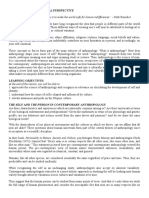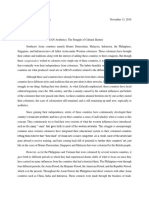4 Basic Moral Principles
4 Basic Moral Principles
Uploaded by
api-352878970Copyright:
Available Formats
4 Basic Moral Principles
4 Basic Moral Principles
Uploaded by
api-352878970Original Title
Copyright
Available Formats
Share this document
Did you find this document useful?
Is this content inappropriate?
Copyright:
Available Formats
4 Basic Moral Principles
4 Basic Moral Principles
Uploaded by
api-352878970Copyright:
Available Formats
4 Universal Moral Principles: Lessons of the Ages
Basic moral principles represent the wisdom of human experience over the ages. These
principles are not collected into any one book, nor are they agreed upon by every human being.
But some principles are so widely held that we can think of them as universals. Here are a few of
these principles:
1. Do good; avoid evil.
This most basic moral principle, the starting point for morality, was articulated by Aristotle, an
ancient Greek philosopher, and is held by all the world's major religions. All other moral
principles flow from this one.
C.C. 1803 "Whatever is true, whatever is honorable, whatever is just, whatever is pure, whatever is
lovely, whatever is gracious, if there is any excellence, if there is anything worthy of praise, think about
these things." A virtue is an habitual and firm disposition to do the good. It allows the person not only to
perform good acts, but to give the best of himself. The virtuous person tends toward the good with all his
sensory and spiritual powers; he pursues the good and chooses it in concrete actions.
2. Do unto others as you would have them do unto you.
All the world's major religions carry an expression similar to the Golden Rule familiar to
Christians: "'Do to others whatever you would have them do to you.'" (Matthew 7:12)
C.C. 1970 The Law of the Gospel requires us to make the decisive choice between "the two ways" and
to put into practice the words of the Lord. It is summed up in the Golden Rule, "Whatever you wish that
men would do to you, do so to them; this is the law and the prophets."
3. The end does not justify the means.
Classical philosophy and the major world religious traditions have upheld the principle that
having a good end (goal or purpose) does not justify the use of evil means (method) to achieve
that end.
``There are those who say: And why not do evil that good may come? Their condemnation is
just' (Rom 3:8).''
C.C.1756 It is therefore an error to judge the morality of human acts by considering only the intention
that inspires them or the circumstances (environment, social pressure, duress or emergency, etc.)
which supply their context. There are acts which, in and of themselves, independently of circumstances
and intentions, are always gravely illicit by reason of their object; such as blasphemy and perjury,
murder and adultery. One may not do evil so that good may result from it.
Also, as Pope John Paul II wrote in The Splendor of Truth:
The foreseeable consequences are part of those circumstances of the act, which, while capable
of lessening the gravity of an evil act, nonetheless cannot alter its moral species.
4. Follow what nature intends.
Known in philosophy as natural law, this principle is not actually a law written down
someplace but, rather, an approach to making decisions that respects the nature of things,
especially human nature. Briefly, natural law tells us this: Follow what is natural for human
beings and the rest of creation. Do not violate the nature of things. For instance, our innate
sense of what is fair and honorable. The universal condemnation of selfishness, senseless
cruelty, and deceit.
Additionally, consider how natural law could apply to humans' tampering with the earth's
environment. For example, it is natural for the earth to have a protective ozone layer around it
to shield animals and plants from the destructive effects of ultraviolet light. Human beings'
damaging of the ozone layer through pollution could be considered a violation of natural law.
C.C. 1956 The natural law, present in the heart of each man and established by reason, is universal in
its precepts and its authority extends to all men. It expresses the dignity of the person and determines the
basis for his fundamental rights and duties:
For there is a true law: right reason. It is in conformity with nature, is diffused among all men, and is immutable and
eternal; its orders summon to duty; its prohibitions turn away from offense . . . . To replace it with a contrary law is a
sacrilege; failure to apply even one of its provisions is forbidden; no one can abrogate it entirely.
You might also like
- Engel 2018 Queer Reading As Power Play Methodological Considerations For Discourse Analysis of Visual MaterialDocument12 pagesEngel 2018 Queer Reading As Power Play Methodological Considerations For Discourse Analysis of Visual MaterialNeylan Ogutveren AularNo ratings yet
- Alatas - The Myth of The Lazy Native - PDFDocument292 pagesAlatas - The Myth of The Lazy Native - PDFasqu87100% (1)
- Basic Electrical AssignmentDocument7 pagesBasic Electrical AssignmentMATHANKUMAR.SNo ratings yet
- Supernaturals: Believe It or Not!Document34 pagesSupernaturals: Believe It or Not!Gerchrisian GuigueNo ratings yet
- Foster Care Act of 2012Document9 pagesFoster Care Act of 2012Arzaga Dessa BCNo ratings yet
- Global StratificationDocument29 pagesGlobal Stratificationegg nogNo ratings yet
- Day 4 - Contemporary Global Governace - Ms. Bualat PDFDocument36 pagesDay 4 - Contemporary Global Governace - Ms. Bualat PDFNiccolo G. ChiongbianNo ratings yet
- Principles in Making Moral DecisionsDocument29 pagesPrinciples in Making Moral DecisionsLea PesiganNo ratings yet
- Group 7 Global CitizenshipDocument17 pagesGroup 7 Global CitizenshipRivera, Lord Angel AlagaseNo ratings yet
- Ethics and Education: PresenterDocument22 pagesEthics and Education: PresenterDnc PerezNo ratings yet
- 1st PARALLEL 1-4 2021-2022Document3 pages1st PARALLEL 1-4 2021-2022Victoria Quebral CarumbaNo ratings yet
- Introduction To World Religion and Belief SystemDocument9 pagesIntroduction To World Religion and Belief SystemSarah VizcarraNo ratings yet
- Globalization of The Asia Pacific and South AsiaDocument69 pagesGlobalization of The Asia Pacific and South AsiaKathlyn TajadaNo ratings yet
- HumanismDocument14 pagesHumanismMicheal MurrayNo ratings yet
- UtsDocument10 pagesUtsGenelle SorianoNo ratings yet
- JNC Module3 Gee5 RresDocument16 pagesJNC Module3 Gee5 Rrespunitpuwit18No ratings yet
- One Past, But Many HistoriesDocument86 pagesOne Past, But Many Historiesdale hernandezNo ratings yet
- Formation Program For The Lay DominicansDocument99 pagesFormation Program For The Lay DominicansJohn Carlo ReyesNo ratings yet
- Lecture 5 - Virtue EthicsDocument41 pagesLecture 5 - Virtue EthicsErica GallurNo ratings yet
- Answer Sa Quiz UtsDocument4 pagesAnswer Sa Quiz UtsCYRIA DAYAONo ratings yet
- 2020 Mindanao Human Rights Report FINALDocument55 pages2020 Mindanao Human Rights Report FINALLolo OhwNo ratings yet
- Christianity PDFDocument22 pagesChristianity PDFEsthel VillamilNo ratings yet
- The Material SelfDocument7 pagesThe Material SelfMildred SuicoNo ratings yet
- Ethics Study Guide For Module 2 ISO 09052020Document8 pagesEthics Study Guide For Module 2 ISO 09052020Tanya Alyssa Untalan AquinoNo ratings yet
- Global Stratification Part5Document41 pagesGlobal Stratification Part5Elshaviona AprillyaNo ratings yet
- Lesson 4: The Self in Western and Eastern ThoughtsDocument24 pagesLesson 4: The Self in Western and Eastern ThoughtsLyca Rose PataniNo ratings yet
- Art Appreciation - Course GuideDocument8 pagesArt Appreciation - Course GuideBilly Joy E. CreusNo ratings yet
- UTS PrelimDocument6 pagesUTS PrelimJustin Paul GallanoNo ratings yet
- Indigenous Peoples of The PhilippinesDocument6 pagesIndigenous Peoples of The PhilippinesJam Steve RianomaNo ratings yet
- PPT1 - The Nature of The SELF - UTSDocument44 pagesPPT1 - The Nature of The SELF - UTSIvy caraNo ratings yet
- Readings in Philippine History IntroductionDocument42 pagesReadings in Philippine History IntroductionCsjr AdmissionsTestingNo ratings yet
- 3 IntuitionismDocument24 pages3 IntuitionismMuneer HussainNo ratings yet
- APRIL CAR Tilte 2017 2018Document11 pagesAPRIL CAR Tilte 2017 2018Ghia Cressida HernandezNo ratings yet
- Syllabus-Contemporary WorldDocument6 pagesSyllabus-Contemporary WorldBrian Jay GimanNo ratings yet
- SECTION 3 What Science Says About The SelfDocument25 pagesSECTION 3 What Science Says About The SelfgheralfredNo ratings yet
- Art Appreciation - Lesson 2Document14 pagesArt Appreciation - Lesson 2Patricia VergaraNo ratings yet
- Physicalselfbyrubi 190319002438 PDFDocument44 pagesPhysicalselfbyrubi 190319002438 PDFemmie musaNo ratings yet
- Globalcitizenship ReportDocument2 pagesGlobalcitizenship ReportPaul Pabilico PorrasNo ratings yet
- Arriesgado College Foundation, Inc.: Prelim ExamDocument2 pagesArriesgado College Foundation, Inc.: Prelim ExamId SunNo ratings yet
- Ethics ModuleDocument24 pagesEthics ModuleIbrahim Hadjirul UtoNo ratings yet
- Activity 2 - The Indolence of The FilipinosDocument2 pagesActivity 2 - The Indolence of The Filipinos2001103622No ratings yet
- Module 1. Introduction To UTSDocument62 pagesModule 1. Introduction To UTSMae SaranteNo ratings yet
- Lesson 1 GED101Document8 pagesLesson 1 GED101LOUIS MARKO ARVIE SEMA�ANo ratings yet
- The Oral Presentation PPT PCDocument39 pagesThe Oral Presentation PPT PCWinsie GarciaNo ratings yet
- The SOCIAL SELFDocument5 pagesThe SOCIAL SELFiced. teaNo ratings yet
- reviewerRPH 023756Document20 pagesreviewerRPH 023756Leannie Baquilod100% (1)
- Physical and Biological SelfDocument2 pagesPhysical and Biological SelfArryanah Faye HerraduraNo ratings yet
- BBC - Ethics - Introduction To Ethics - Ethics - A General IntroductionDocument8 pagesBBC - Ethics - Introduction To Ethics - Ethics - A General IntroductionPraveen VermaNo ratings yet
- Lesson 4 - Determinants of MoralityDocument6 pagesLesson 4 - Determinants of MoralityAlexa Febiejoy SespeneNo ratings yet
- Chapter 2 The Sociological Perspective of The Self e ModuleDocument11 pagesChapter 2 The Sociological Perspective of The Self e ModuleLois Alzette Rivera AlbaoNo ratings yet
- Moral Vs Non Moral StandardsDocument38 pagesMoral Vs Non Moral StandardsLeonel DolendoNo ratings yet
- Lesson 11 Filipino Cultural ValuesDocument39 pagesLesson 11 Filipino Cultural Valuesren100% (1)
- Lesson 5 - Political Thought Noe Cabusao AB-Political Science LLDocument2 pagesLesson 5 - Political Thought Noe Cabusao AB-Political Science LLNoe Carillo CabusaoNo ratings yet
- The Effects of The ReformationDocument4 pagesThe Effects of The ReformationWalter JothirajNo ratings yet
- HomecomingDocument34 pagesHomecomingSheila G. DolipasNo ratings yet
- Anthropological PerspectiveDocument5 pagesAnthropological PerspectivePrincess CaranguianNo ratings yet
- Pol Thought 4Document2 pagesPol Thought 4Ofel Jemaimah OblanNo ratings yet
- The Self in Western and Eastern Thoughts 1Document16 pagesThe Self in Western and Eastern Thoughts 1Cassandra Kate GuerreroNo ratings yet
- Freudian RevolutionDocument14 pagesFreudian RevolutionAngela PalmaresNo ratings yet
- Philippine CultureDocument13 pagesPhilippine CultureElaine VelascoNo ratings yet
- Natural Law and Moral NormsDocument30 pagesNatural Law and Moral NormsAudrey C. JunsayNo ratings yet
- Natural Law Ethics 2Document26 pagesNatural Law Ethics 2Qwerty AsdfghNo ratings yet
- Fundamentals of EthicsDocument9 pagesFundamentals of EthicsMary ChristelleNo ratings yet
- Self ConceptDocument11 pagesSelf ConceptEr IcNo ratings yet
- Webex 3 JTW 106e Juw 106e Jan 14 2017Document32 pagesWebex 3 JTW 106e Juw 106e Jan 14 2017sufiey84No ratings yet
- Coss Bulletin 14 - FinalDocument18 pagesCoss Bulletin 14 - Finalsain158No ratings yet
- Intellectuals and Power Delez FukoDocument8 pagesIntellectuals and Power Delez FukoLuka TripkovicNo ratings yet
- Reaction Paper (Arts)Document2 pagesReaction Paper (Arts)Alexa HernandezNo ratings yet
- The İdeology of Ba'ath PartyDocument7 pagesThe İdeology of Ba'ath Partyelifcevik7No ratings yet
- Ethiopia's Unacknowledged Problem - The Oromo (Paul Baxter)Document15 pagesEthiopia's Unacknowledged Problem - The Oromo (Paul Baxter)Waqo100% (1)
- Love and Intimate Relationships IIDocument61 pagesLove and Intimate Relationships IIAmorsolo EspirituNo ratings yet
- 2.3. History - AnthropologyDocument18 pages2.3. History - AnthropologyJohn Seth Toribio SalazarNo ratings yet
- Smart Goal MagnetsDocument11 pagesSmart Goal Magnetsapi-382003805100% (1)
- Thesis (Chapters 1 To 6)Document67 pagesThesis (Chapters 1 To 6)Crnc Navidad67% (3)
- Virtue EthicsDocument28 pagesVirtue EthicsHello WorldNo ratings yet
- What Is The Difference Between Hard Work and Smart Work - HR Interview Questions and AnswersDocument9 pagesWhat Is The Difference Between Hard Work and Smart Work - HR Interview Questions and AnswersMohammad AsifNo ratings yet
- 24.253 2nd Paper Questions S13Document3 pages24.253 2nd Paper Questions S13Jane McdoeNo ratings yet
- VesvikarDocument7 pagesVesvikarKirolos M. NasimNo ratings yet
- Phrases / Proverbs: English (Precis & Composition)Document34 pagesPhrases / Proverbs: English (Precis & Composition)Waqarali ShahNo ratings yet
- Topics/ Learning Competencies: Table of Specifications Philosophy of The Human Being First Quarter Test - SY 2017-2018Document2 pagesTopics/ Learning Competencies: Table of Specifications Philosophy of The Human Being First Quarter Test - SY 2017-2018Piven James SarongNo ratings yet
- My Own PhilosophyDocument5 pagesMy Own PhilosophyNiña Lei LunaNo ratings yet
- TIPqc DESIGN 9 Thesis Manual 02.1617 Rev00Document24 pagesTIPqc DESIGN 9 Thesis Manual 02.1617 Rev00MarkNovaNo ratings yet
- Final Year ProjectDocument3 pagesFinal Year ProjectSai SankalpNo ratings yet
- Converse, Inverse and Contrapositive of An If-Then StatementDocument16 pagesConverse, Inverse and Contrapositive of An If-Then StatementMarissa TrinidadNo ratings yet
- Affirmations For SuccessDocument10 pagesAffirmations For SuccessJanzeb SamedwInNo ratings yet
- IB DP Assessment Procedures Class of 2020Document46 pagesIB DP Assessment Procedures Class of 2020Susan SharkeyNo ratings yet
- Forecasting Gold Prices Using Fuzzy C MeansDocument8 pagesForecasting Gold Prices Using Fuzzy C MeansJournal of ComputingNo ratings yet
- Introduction To Algorithms: Unit 1Document42 pagesIntroduction To Algorithms: Unit 1rushanandNo ratings yet
- Assignment-8-Ghayoor ZafarDocument8 pagesAssignment-8-Ghayoor Zafarjgfjhf arwtrNo ratings yet
- Producing Father Nelson H. Baker: The Practices of Making A SaintDocument317 pagesProducing Father Nelson H. Baker: The Practices of Making A SaintHeather AnneNo ratings yet

























































































